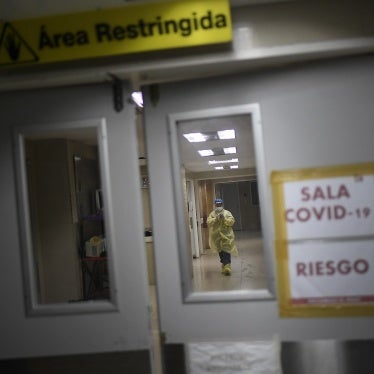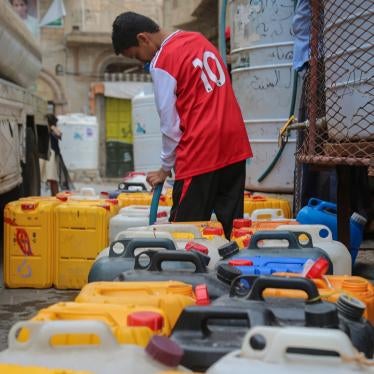An approach to country engagement that analyses, articulates, and addresses human rights risks is critical to meeting the “twin goals” of ending extreme poverty and promoting shared prosperity. The World Bank Group’s New Approach to Country Engagement as outlined in the 2013 World Bank Group Strategy can be a meaningful first step to achieving this. It presents the Group with an opportunity to both identify key obstacles to poverty reduction and inclusive growth, including human rights obstacles, and align priorities with the steps needed to tackle such challenges.
Human Rights Watch recommends that the World Bank Group’s New Approach to Country Engagement provides for:
1. Meaningful participation, including by actively working to support an enabling environment for civil society, the media;
2. Assessment and articulation of human rights risks;
3. Addressing discrimination and inequality; and
4. Addressing corruption.
1. Require Meaningful Participation
The World Bank has increasingly emphasized the importance of civic participation and social accountability to sustainable development, especially in the wake of the popular upheavals in the Arab world, and enhanced its internal processes to increase transparency and consultation with civil society.[i] However, despite this, practice is very mixed.
The “World Bank Group: A New Approach to Country Engagement” revised consultation draft states, “to fully understand a country’s context and its development needs, it is necessary to consult and engage with stakeholders—the government, civil society, the private sector, and others.”[ii] Human Rights Watch welcomes the emphasis that the framework places on “explicitly considering the voices of the poor,”[iii] and the Group’s commitment that the Systematic Country Diagnostic (SCD) and Country Partnership Framework (CPF) will be produced in a collaborative process in consultation with civil society.[iv] But as the United Nations special rapporteur on extreme poverty and human rights has stated, “Consultation alone is not enough; those who are affected … must have a say in the decisions that affect their lives.”[v]
In situations where the Group is unable to prepare a CPF or commit to medium-term goals due to uncertainty in conflict or during re-engagement processes, it will prepare a Country Engagement Note (CEN) in place of an Interim Strategy Note. The CEN only requires consultations with civil society “to the extent possible.”[vi] In order to ensure that CENs provide the necessary analytical framework for WBG country engagement, it is critical that the Bank provides more guidance as to the standard of consultation and analysis needed to produce a CEN and requires minimum processes that provide for meaningful participation.
With a backdrop of closing space for civil society in many parts of the world, the World Bank Group’s partners are increasingly governments that routinely attack anti-corruption, labor, and environmental activists and other human rights defenders, and the media—violating the rights to freedom of expression, assembly, and association.[vii] These rights violations also adversely impacts on social and economic rights.[viii] We urge the World Bank Group to lend its analysis and voice to opening space for civic participation and social accountability.
The World Bank Group should:
· Publish drafts of strategy and key project documents for a defined comment period to ensure civic participation and substantive exchange with civil society.[ix] Publish comments received (with consent of the interveners) and provide them to the Board of Executive Directors. Other international financial institutions, including for instance the European Bank for Reconstruction and Development, already do this. The Bank’s current process of including a short summary of consultations to the Board has on occasion produced an incomplete or skewed picture.[x]
· Analyze the environment for speech, expression, and assembly, as well as transparency and access to information, while preparing the SCD, recognizing the importance of participation, transparency, and accountability for sustainable development. This should include an analysis of laws and practices that restrict free speech or the operations of civil society organizations, including regulatory and anti-terrorism laws that violate international law. Work with governments to integrate necessary steps to address these issues in CPFs.
· Consider the environment for expression, association, and assembly when planning consultation processes, and require meaningful participation of civil society at all stages of the engagement cycle from the SCD or CEN and continuing engagement through the CPF, implementation, and learning stages. Minimum standards should include: the provision of adequate, relevant, timely information in nationally-appropriate language(s) and specific outreach, including to indigenous peoples, women, persons with disabilities, ethnic, linguistic, and religious minorities, sexual and gender minorities, and others who face discrimination or marginalization.
2. Assess and Articulate Human Rights Risks
The revised consultation draft acknowledges that “a number of civil society groups were concerned that the SCD and the CPF properly account for risks to development posed by corruption, poor governance, abuse of human rights and environmental concerns.”[xi] The current guidance in the consultation draft and the “Interim Guidelines for Systematic Country Diagnostic” do not adequately address these concerns. Although consulting with civil society on the SCD and CPF will help to identify some of the major constraints and opportunities to achieving the twin goals in a country, in light of the reticence of some World Bank staff to talk about human rights, some constraints may not be adequately integrated without an explicit requirement and mandate to assess human rights risks and articulate them to client governments. We urge you to ensure that the “systemic accounting of risk” includes human rights risks.[xii]
In the context of fragile and post conflict countries, the consultation draft asserts that “the SCD will be a rigorous analysis that will be informed by a fragility assessment where appropriate. The CPF is flexible, with a continuous process of monitoring and evaluation that allows it to adjust to changing circumstances and learning through implementation.”[xiii] More clarity is needed on what the parameters for adequate consultation and risk analysis will be in these contexts. Also, while a CEN does not require an SCD, it will include an “assessment of risks.”[xiv] It is essential that the CEN adequately capture human rights risks.
We urge the World Bank Group to use its New Approach to Country Engagement to take proactive measures to identify and address human rights risks. Human rights concerns that should be covered will vary greatly from country to country, but may include, for example, sectarian violence, ethnic conflict, inadequate labor protections, or widespread forced evictions or other land-related concerns, as well as discrimination and corruption issues discussed further below.
The World Bank Group should:
· Explicitly require analysis of human rights concerns that constrain poverty eradication and shared prosperity. The Bank should also provide more clarity in the CEN and SCD documents on what mechanisms will be used to identify, assess and rate human rights risks, how the tool will be used to plan and mitigate those risks, and how communities will be involved in helping assess and mitigate real risks, especially ones associated with sensitive social matters such as human rights.
3. Address Discrimination and Inequality
Discrimination can cause poverty and be a hurdle in alleviating poverty, as the World Bank has recognized with respect to gender discrimination. In order to ensure that its development initiatives are inclusive, the World Bank Group should analyze, articulate, and actively work with governments to dismantle all forms of discrimination and marginalization.
While disaggregated data is not available with respect to each marginalized group, recently published data suggests more than two thirds of extremely poor people in low income countries and lower-middle income countries live in households where the household head is from an ethnic minority group. It also tells us that more than three quarters of extremely poor people live in rural areas.[xv]
Further, more than 80 percent of people with disabilities live in developing countries, illustrating both the confluence of poverty and disability and the importance of proactively addressing the needs of people with disabilities in development strategies.[xvi] Human Rights Watch has also documented discrimination based on political opinion in the distribution of aid.[xvii] In addition, discrimination limits peoples’ ability to participate in the development of poverty reduction strategies or government policies and limits access to justice, compounding the problem.
The fundamental human rights guarantees of equality and non-discrimination are legally binding obligations. Human rights law prohibits discrimination on the basis of a wide range of grounds, including race, color, sex, language, religion, political or other opinion, national or social origin, property, birth or ‘other status,’ as well as marital or family status, descent or ethnic origin, disability, nationality, age, health status, sexual orientation and gender identity, and economic position. Children are to be protected against discrimination on the basis of the status, activities, expressed opinions, or beliefs of the child’s parents, legal guardians, or family members.
Eliminating discrimination and ensuring equality may require legislative or administrative reforms to repeal discriminatory provisions or address discriminatory practices by the government or private actors, changes in resource allocation, or educational measures, and may include temporary special measures.[xviii]
The World Bank Group should:
· Articulate any concerns regarding discrimination and marginalization, including obstacles to substantive equality, in both routine and high level meetings with government officials. This should include providing guidance for how to incorporate the human rights risks identified in the SCD results into the discussions with governments during the CPF.
· Systematically assess the environment for discrimination and marginalization, including obstacles to substantive equality, when analyzing the risks related to and impacts of proposed projects or programs.
· Strengthen data collection and analysis along grounds of discrimination to increasingly identify barriers to poverty eradication in individual projects. It may not be feasible to disaggregate data by all potential grounds of discrimination, but at a minimum the World Bank Group should collect data disaggregated by gender, marital status, demographic group (i.e. ethnic background, language, religion), locale (rural/urban/slum household, state/territory), age, and disability.
· Ensure that its systems for measuring results of a CPF determine the extent to which Group investments reach marginalized communities and incorporate their inputs and perspectives, including the most poor, women, people with disabilities, and ethnic, linguistic, and religious minorities.
4. Address Challenges to Fiscal Transparency and Accountability
Through the SCD, the World Bank Group should identify key challenges to fiscal transparency and accountability, including evidence of governmental corruption and particular concerns about diversion and mismanagement of revenues. For instance, this may include, depending on the country, highlighting lack of parliamentary oversight over certain government budgets and expenditures; off-budget funding of the military including via military conglomerates or the lack of civilian accountability over military finances; problems with sovereign wealth funds; the absence of or effectiveness of measures to combat corruption and enhance accountability, including creation of independent oversight bodies, auditing of all government departments and government spending and publication of these audits, open bidding and tendering for government procurement processes, with results published, and publication of contracts for natural resource extraction and sales; or a government’s failure to invest its own resources in the economic and social needs of the population, including minority groups.
The IMF’s Code of Good Practices on Fiscal Transparency, which identifies a set of principles and practices to help governments provide a clear picture of the structure and finances of government and to help ensure that funds are used appropriately and that this use is subject to auditing and public disclosure, is a key standard to apply.[xix]
The World Bank Group should:
Articulate any fiscal transparency and accountability or corruption concerns in the SCD and work with the government to address them through the CPF.
[i]See, for instance, former World Bank president Robert Zoellick’s April 2011 landmark speech, “The Middle East and North Africa: A New Social Contract for Development,” April 6, 2011, http://www.worldbank.org/en/news/2011/04/06/middle-east-north-africa-new... http://live.worldbank.org/speech-robert-zoellick-new-social-contract-dev... (accessed April 8, 2013). This enhanced focus has manifested in the Global Partnership on Social Accountability, a new funding mechanism for nongovernmental organizations: World Bank Group, “World Bank Global Partnership on Social Accountability Approved by Board of Executive Directors,” June 25, 2012, http://go.worldbank.org/LRLHHQMA30l (accessed August 31, 2012).
[ii]World Bank Group, “A New Approach to Country Engagement,” April 29, 2014, http://www-wds.worldbank.org/external/default/WDSContentServer/WDSP/IB/2... (accessed May 20, 2014)
[iii]Ibid.
[iv]Ibid, p.11.
[v]Magdalena Sepúlveda Carmona, “Report of the Special Rapporteur on extreme poverty and human rights, Magdalena Sepúlveda Carmona - Mission to Timor-Leste,” U.N. Doc. A/HRC/20/25/Add.1, May 24, 2012, http://www.ohchr.org/Documents/HRBodies/HRCouncil/RegularSession/Session... (accessed May 1, 2013), para. 24.
[vi]World Bank Group, “A New Approach to Country Engagement,” April 29, 2014, http://www-wds.worldbank.org/external/default/WDSContentServer/WDSP/IB/2... (accessed May 20, 2014), p. 11.
[vii]CIVICUS, “Civil Society: The Clampdown is Real,” 2010, http://www.civicus.org/content/CIVICUS-Global_trends_in_Civil_Society_Sp... (accessed May 20, 2014).
[viii]For example, see Human Rights Watch, “My Children Have Been Poisoned” for a discussion of how limited access to information and intimidation by police and government officials has dissuaded people from raising the problem of lead poisoning with local government officials in Henan, Yunnan, Shaanxi, and Hunan provinces in China: https://www.hrw.org/node/99441/section/6.
[ix]As the special rapporteur on human rights and extreme poverty has noted, meaningful participation is “impossible without the dissemination of information in accessible languages and without the support of public officials who are able to communicate with minorities.” Magdalena Sepúlveda Carmona, “Report of the independent expert on the question of human rights and extreme poverty, Mission to Viet Nam,” U.N. Doc A/HRC/17/34/Add.1, May 9, 2011, http://daccess-ods.un.org/TMP/2618596.25577927.html (accessed May 1, 2013).
[x]For instance, the summary of consultations on the Interim Strategy Note for Myanmar failed to capture the view of many members of civil society that engagement should be staged to best support governance reforms. World Bank Group, “Interim Strategy Note FY13-14: Myanmar,” October 30, 2012, http://reliefweb.int/sites/reliefweb.int/files/resources/724580ISN0IDA00... (accessed July 14, 2013), Annex 4.
[xi]World Bank Group, “A New Approach to Country Engagement,” April 29, 2014, http://www-wds.worldbank.org/external/default/WDSContentServer/WDSP/IB/2... (accessed May 20, 2014), p. 16.
[xii]Ibid., p.10.
[xiii]Ibid.
[xiv]Ibid, p. 20.
[xv]A. Sumner, “The New Face of Poverty: How has the Composition of Poverty in Low Income and Lower Middle-Income Countries (excluding China) Changed since the 1990s?,” Institute of Development Studies, 408, (2012), http://www.ids.ac.uk/publication/the-new-face-of-poverty-how-has-the-com... (accessed April 8, 2013); A. Sumner, “The New Face of Poverty? Changing Patterns of Education, Health and Nutrition in Low and Lower Middle-Income Countries by Spatial and Social Characteristics of Households, 1998 vs. 2007, IDS Working Paper, table reproduced in ODI, Post-2015: the road ahead,” http://www.odi.org.uk/sites/odi.org.uk/files/odi-assets/publications-opi... (accessed ) p. 6-7.
[xvi]World Programme of Action Concerning Disabled Persons, “Current situation,” 2006, http://www.un.org/esa/socdev/enable/diswpa04.htm, (accessed April 8, 2013).
[xvii]Human Rights Watch, Development without Freedom: How Aid Underwrites Repression in Ethiopia, October 19, 2010, https://www.hrw.org/reports/2010/10/19/development-without-freedom-0.
[xviii]UN Committee on Economic, Social and Cultural Rights, General Comment No. 20, Non-Discrimination in Economic, Social and Cultural Rights (art. 2, para. 2), U.N. Doc. E/C.12/GC/20 (2009), http://www2.ohchr.org/english/bodies/cescr/comments.htm, para. 39.
[xix]Also reflected in the IMF Guide on Resource Revenue Transparency and other initiatives. See International Monetary Fund (IMF), Code of Good Practices on Fiscal Transparency, 2007, www.imf.org/external/np/pp/2007/eng/051507c.pdf (accessed August 3, 2012); and IMF, Guide on Resource Revenue Transparency, 2007, www.imf.org/external/np/pp/2007/eng/051507g.pdf (accessed August 3, 2012). In 2012 the IMF began work to prepare a board paper on “Natural Resources Wealth Management.” See IMF, Consultation on IMF Natural Resources Work, July 2012, www.imf.org/external/np/exr/consult/2012/NR/ (accessed August 3, 2012). See also, for example, International Working Group of Sovereign Wealth Funds, “Generally Accepted Principles and Practices (GAPP)—Santiago Principles,” http://www.iwg-swf.org/pubs/gapplist.htm, the principles underlying the Extractive Industries Transparency Initiative (EITI), the Natural Resource Charter, and the Global Initiative on Fiscal Transparency at: Extractive Industries Transparency Initiative (EITI), The EITI Principles and Criteria, June 2003, http://eiti.org/eiti/principles(accessed August 3, 2012); The Natural Resource Charter, The Twelve Precepts, http://www.naturalresourcecharter.org/precepts(accessed August 3, 2012); and The Global Initiative for Fiscal Transparency (GIFT), Draft High-Level Principles on Fiscal Transparency, http://fiscaltransparency.net/ (accessed August 3, 2012).






